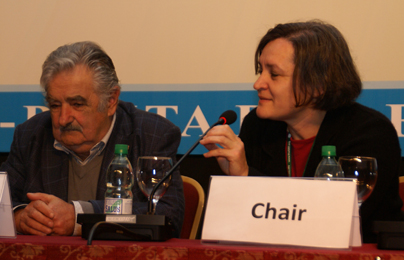28 May 2010: The fourth Assembly of the Global Environment Facility (GEF) was held in Punta del Este, Uruguay, on 25-26 May 2010.
The Assembly was preceded by a Civil Society Forum and a GEF Council meeting, which took place at the same venue.
The GEF Assembly gathered GEF stakeholders to review the policies and […]
 28 May 2010: The fourth Assembly of the Global Environment Facility (GEF) was held in Punta del Este, Uruguay, on 25-26 May 2010. The Assembly was preceded by a Civil Society Forum and a GEF Council meeting, which took place at the same venue.
28 May 2010: The fourth Assembly of the Global Environment Facility (GEF) was held in Punta del Este, Uruguay, on 25-26 May 2010. The Assembly was preceded by a Civil Society Forum and a GEF Council meeting, which took place at the same venue.
The GEF Assembly gathered GEF stakeholders to review the policies and operations of the Facility. Assembly participants took note of the report on the results of the Fifth GEF Replenishment, where over 30 countries pledged to contribute US$4.25 billion to the GEF Trust Fund, and approved amendments to the Instrument for the Establishment of the Restructured GEF (GEF/A.4/9) on: eliminating the role of implementing agencies in appointing the GEF CEO; making the GEF available to serve as a financial mechanism of the UN Convention to Combat Desertification (UNCCD); and the GEF CEO appointment and term limits.
Over 1,000 participants attended the Assembly, representing member States, UN agencies, non-governmental organizations (NGOs), academia and the private sector. The event featured discussions on two broad areas of reform, namely: enhancing country ownership; and improving the effectiveness and efficiency of the GEF. Participants also took part in numerous side events and in an exhibition area featuring the work of donors, recipients, civil society, international organizations and implementing agencies. The host country also organized several visits to GEF project sites. A special event to celebrate the International Year of Biodiversity took place on 27 May in the Uruguayan Parliament.
The GEF acts as a financial mechanism, assisting developing countries in meeting the objectives of four multilateral environmental agreements (MEAs): the Convention on Biological Diversity (CBD); the UN Framework Convention on Climate Change (UNFCCC) and its Kyoto Protocol; the UNCCD; and the Stockholm Convention on persistent organic pollutants (POPs). The GEF also collaborates closely with other related treaties and agreements like the Vienna Convention on the Protection of the Ozone Layer.
GEF funding is channeled to recipient countries through ten agencies: the UN Development Programme (UNDP); the UN Environment Programme (UNEP); the World Bank; the UN Food and Agriculture Organization (FAO); the UN Industrial Development Organization (UNIDO); the African Development Bank (AfDB); the Asian Development Bank (ADB); the European Bank for Reconstruction and Development (EBRD); the Inter-American Development Bank (IDB); and the International Fund for Agricultural Development (IFAD). [IISD RS Coverage of the Fourth GEF Assembly] [Fourth GEF Assembly Website]